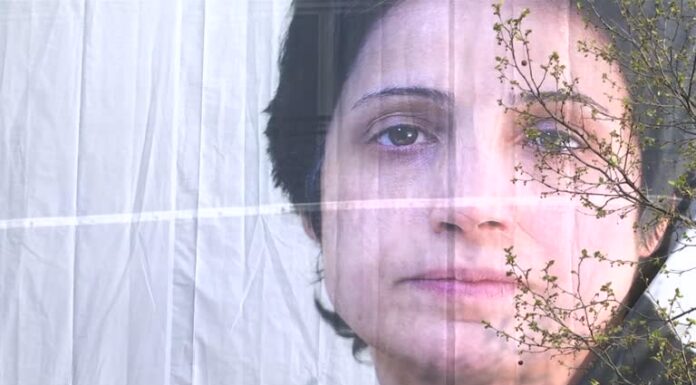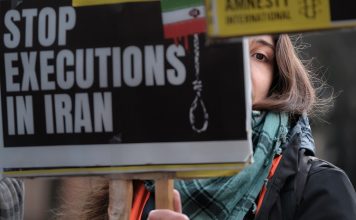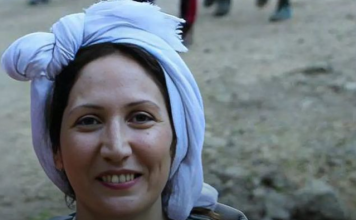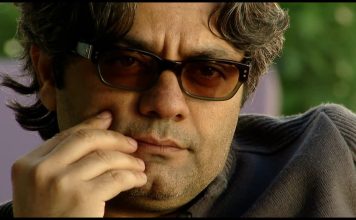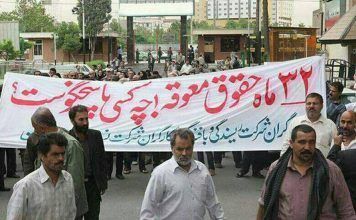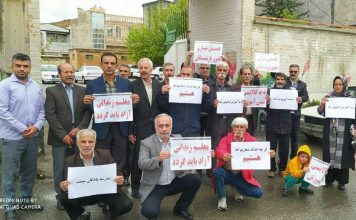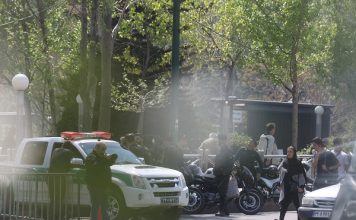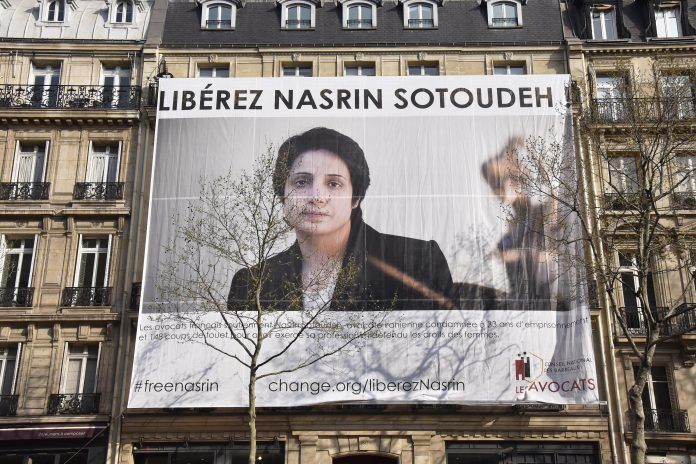
By Ahmad Rafat
The Iranian human rights lawyer Nasrin Sotoudeh, was awarded the Robert Badinter Award at the 8th World Congress Against the Death Penalty on Nov. 18 in Berlin.
The event was sponsored by the French organization Ensemble Contre la Peine de Mort (EPCM), also known by its English name, the World Coalition Against the Death Penalty — an alliance of some 120 NGOs, bar associations, local authorities, and unions, created in Rome on May 13, 2002.
Mahmoud-Amiri Moghaddam, the founder of the Iran Human Rights organization (IHRNGO) based in Norway, accepted the award on behalf of Ms. Sotoudeh from Christiane Taubira, a former French Justice Minister.
Nasrin Sotoudeh was one of four people nominated for the award, which is named after Robert Badinter, the French Justice Minister who abolished the death penalty in France in 1981.
After receiving news of her award nomination, Nasrin Sotoudeh, a lawyer and political prisoner currently on a medical furlough, sent a message which was read at the ceremony by Mr. Moghaddam.
The following is the full text of Nasrin Sotoudeh’s message to the 8th World Congress Against the Death Penalty:
Honorable President of the World Congress against the Death Penalty
Dear members,
With my due respect,
Recently, I have been informed that I am one of the four candidates for the Robert Badinter Public Grand Prix.
Oh! What a fine opportunity to make our voices heard by the world and especially by your prestigious congress at a time when death sentences cast a shadow over our protesting youths in Iran.
I do not yet know whom I have the honor of being nominated alongside, but without a doubt, they are all more deserving of this prize than I am. I am actually going to ask them and all participants at the congress who are attending out of concern, for help.
I, Nasrin Sotoudeh, a lawyer and political prisoner in Iran, ask all the world and this congress to be the eyes and ears of Iranians during these difficult days. Days that see young people who have used their legal right to participate in the “Woman, Life, Freedom” protests be unfairly sentenced to death.
Changing the government’s behavior towards the protesters and preventing the judiciary from executing protesters will help to abolish the death penalty in future Iran.
These days, public opinion in Iran is closer than ever to abolishing the death penalty and aligning with the goals of the global human rights community to realize a life based on peace, justice, and law.
Therefore, as a respectable civil institution, we ask you to help us establish peace and justice and abolish the death penalty; may your support and solidarity in conveying the voice of Iranians for justice be the beginning of the end of the death penalty.
With best regards
Nasrin Sotoudeh
Iran, Tehran
November 2022
Government ministers from Europe, Asia, and Africa attended the 8th World Congress Against the Death Penalty’s opening session on Nov. 15 in Berlin.
Some 1,500 representatives from 126 countries participated in talks, roundtable discussions, and workshops during the three-day event.
Mahmoud-Amiri Moghaddam, the director of IHRNGO, spoke at a roundtable discussion titled “Instrumentalization of The Death Penalty for Political Purposes,” held on the first day of the congress.
Mr. Moghaddam explained how the Islamic Republic had used capital punishment to threaten and scare the population in the past four decades.
He noted that the Islamic Republic increases the number of executions anytime the West engages the regime in discussions. For instance, the number of people hanged in Iran rose during the 2015 Joint Comprehensive Plan of Action (JCPOA), the Iran nuclear deal.
During another roundtable discussion titled “Same Fight, Same Risk: Lawyers and Journalists as Actors for Abolition,” also held on the first day of the congress, Iranian journalist Kambiz Ghafouri spoke about the arrests of journalists in the past two months in Iran.
Iranian authorities have reportedly arrested 62 journalists, 14 of whom have been released on bail. However, one has been re-arrested.
Mr. Ghafouri said that two journalists, Niloufar Hamedi, and her colleague Elahe Mohammadi, who respectively covered the death of Mahsa (Zhina) Amini and her funeral, were currently in prison.
Javaid Rehman, a British-Pakistani legal scholar, who has been the UN Special Rapporteur on the human rights situation in the Islamic Republic of Iran since 2018, participated in a roundtable discussion titled “The Death Penalty and Lack of Transparency: Global Impact on Human Rights,” held on the second day of the congress.
Mr. Rehman spoke about the need to force the Islamic Republic to be transparent and hold Iranian officials responsible for human rights violations.
He called for the creation of a fact-finding mechanism within the UN’s framework to determine the instances of human rights violations inside Iran and identify the culprits.
Similar proposals by human rights organizations and petitions with a high number of signatures will be included in the UN Human Rights Council’s Special Session on the Islamic Republic of Iran, to be held on Nov. 24 in Geneva.
Iranian institutions present at the 8th World Congress Against the Death Penalty also held a news conference.
Mahmoud-Amiri Moghaddam of IHRNGO, Roya Boroumand from the Abdorrahman Boroumand Foundation, Tamour Eliassi from Kurdistan Human Rights, Rose Paris Richter of Impact Iran coalition, and Raphael Chnuil-Hazan, the head of the ECPM, spoke at the news conference.
Shole Pakravan, the mother of Reyhaneh Jabbari, also spoke at the conference, stressing the need to pressure the Islamic Republic not to execute those arrested and sentenced to death during the recent protests in Iran.
Reyhaneh Jabbari was sentenced to death for murdering a man who had attempted to rape her. She was hanged on Oct. 25, 2014. Ms. Jabbari was only 19 years old at the time of her arrest in 2007.
Impact Iran coalition also organized a meeting to inform representatives from other countries opposing capital punishment of the current situation in Iran.
Representatives from several Iranian institutions and Javaid Rehman, the UN Special Rapporteur on the human rights situation in the Islamic Republic of Iran, attended the meeting.
Mr. Rehman reiterated the need to force the Islamic Republic to be transparent and hold Iranian officials responsible for human rights violations.
At the meeting, Mahmoud-Amiri Moghaddam said the Islamic Republic must pay a heavy political price for executing protesters.
He argued that if the international community were to increase pressure on the Islamic Republic, it would back down as it had in the past.
World Marks Day Against Death Penalty; Iran Holds Second-Highest Execution Rate

